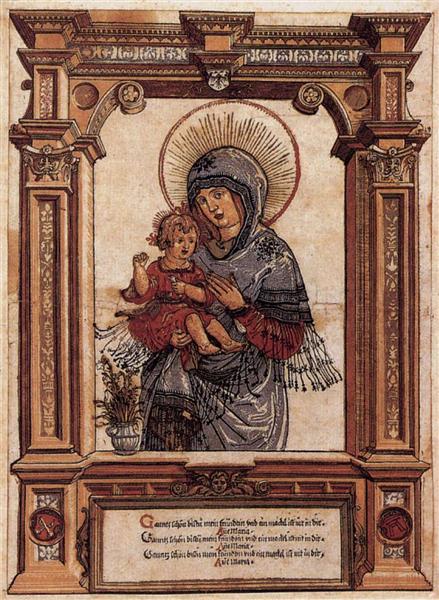Description
The work "The beautiful Virgin of Ratisbona" by Albrecht Altdorfer, created in 1520, is erected as a testimony of the Renaissance mastery that fuses religious devotion with artistic innovation. This prominent German painter, known for his unique approach to light and landscape, captures in this work the figure of the Virgin Mary, who occupies the center of the canvas, with a delicacy and sublimity that transcend the merely religious.
From a first look, the composition of the painting is remarkable for its symmetry and the prominent position of the Virgin, which shines with an aura of purity and grace. Dressed in a rich blue tunic, which symbolizes divinity and royalty, its face radiates serenity and compassion, elements that have been interpreted as an invitation to spiritual contemplation. The soft lighting that surrounds his figure seems to emanate from herself, which suggests her role as a bearer of light in the world. This luminous effect is not accidental, but denotes Altdorfer's mastery in the manipulation of color and light, elements that were already fascinating in the context of the art of northern Europe.
The background of the work is equally important; It is full of details that reveal Altdorfer's inclination for nature and the landscape, aspects that become recurring in his work. In this painting, the landscape is transformed into a scenario that accentuates the figure of the Virgin, with trees that rise elegantly and a diaphanous sky that invites the viewer to get lost in their vastness. The way in which the landscape interacts with the central figure helps establish a symbolic connection between the divine and the earthly, a duality that Altdorfer explores with remarkable sensitivity.
One of the most charming details of this work is the integration of decorative elements that adorn the scene. Flowers and plants, which can be read as much as ornaments and references to divine creation, enrich the general atmosphere of the work. Each petal, each sheet, is painted with a meticulousness that not only demonstrates the artist's technical skill, but also provides a sense of responsibility towards nature that was characteristic of the Renaissance. In this sense, Altdorfer not only portrays the Virgin, but also offers a tribute to the beauty of the natural world.
It should be noted that Alrear Altdorfer, contemporary of artists such as Hans Holbein the young man and Lucas Cranach el Viejo, is in a unique space within the tradition of Nordic art, where symbolism and landscaping are intertwined. His interest in light and colorimetry is distinguished in his corpus of works, which gives him a unique voice in the narrative of the art of the Renaissance.
Throughout his career, Altdorfer explored spirituality and nature so that few artists of his time dared to do. "The beautiful Virgin of Ratisbona" is not only a testimony of her technical ability and sense of beauty, but also a reminder of the fundamental role of art in mediation between man and the divine. The work is presented as a visual shelter in which it invites us to reflect on grace and hope, characteristics that continue to resonate in the contemporary spectator. When contemplating this magnificent work, one can feel the universality of his message, which transcends time and space, reaffirming the ability of the art of continuing to play souls over the centuries.
KUADROS ©, a famous paint on your wall.
Hand-made oil painting reproductions, with the quality of professional artists and the distinctive seal of KUADROS ©.
Reproduction service paintings With a guarantee of satisfaction. If you are not completely satisfied with the replica of your painting, we refund your money 100%.

